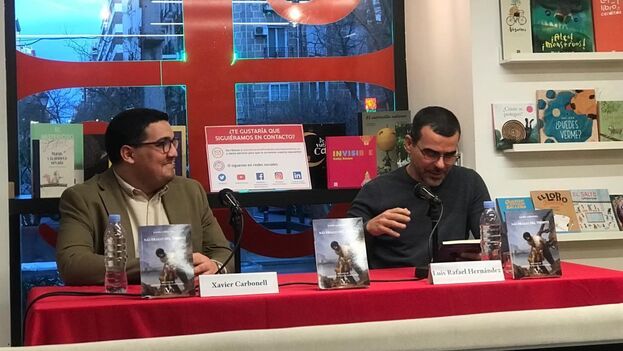
![]() 14ymedio, Yaiza Santos, Madrid, 8 March 2023 – Xavier Carbonell (born in Camajuaní, Villa Clara, Cuba in 1995) is spurred on by the desire to distance himself from the most common themes of other living Cuban writers (the pain of being exiled from a place, the misery of being in another place) and aims, above all, for excellence in the use of language. And it’s precisely this which his second novel, Time’s Castaway (published in Spain by Verbum), has in common with his first, The End of the Game (del Viento; winner of the City of Salamanca prize) — although they are very different novels (one a detective novel, the other an adventure).
14ymedio, Yaiza Santos, Madrid, 8 March 2023 – Xavier Carbonell (born in Camajuaní, Villa Clara, Cuba in 1995) is spurred on by the desire to distance himself from the most common themes of other living Cuban writers (the pain of being exiled from a place, the misery of being in another place) and aims, above all, for excellence in the use of language. And it’s precisely this which his second novel, Time’s Castaway (published in Spain by Verbum), has in common with his first, The End of the Game (del Viento; winner of the City of Salamanca prize) — although they are very different novels (one a detective novel, the other an adventure).
The author introduced the new book on Tuesday, at a presentation in Madrid in the Juan Rulfo bookshop. “The castaway never knows where he’s going but he’s very keen to survive or live as best he can. He doesn’t live with anxiety. The castaway’s attitude is the opposite of an exile’s because the castaway continually adapts to circumstances”.
Carbonell didn’t refer only to this novel, but he does define it as “a journey from the present into the island’s past”. In it, the protagonist, effectively a castaway, travels the Island geographically, but also historically”, towards the East, ironically emulating the journey of Fidel Castro’s ashes, which in its time was the inverse of the “Caravan of Liberty” of 1959.
He also talked about life. The image of a castaway is agreeable to him and it’s not by chance that his column in 14ymedio is called Castaways.
The novels that he writes, and the process of writing them, are, he confessed at the event, “little refuges” from circumstances: “a way of expressing oneself in code about the present”.
Actually, he first conceived of Time’s Castaway three years ago in India, where he’d travelled to spend six months studying, thanks to his work with the association Signis de comunicadores católicos. But at the end of the programme the sudden arrival of the pandemic left him stranded there. “What could I write about Cuba that didn’t just repeat either the usual creative option of exile nor the insular obsession with misery?”, he asked himself. The result was this novel, which, he assures us, was written in one great surge — inside a week.
The book’s editor Luis Rafael Hernández, there on the platform with the author, praised the “linguistic achievement” of the novel, which, in his words, “without being avant-garde, pays much homage to the avant-garde”, and he mentioned Alejo Carpentier and José Lezama Lima, in that regard.
When they received the novel at Verbum, he explained, “it felt to us like we needed to go for an author who was ambitious and who was doing something different and well crafted”.
The writer and literary critic Roberto González Echevarría undoubtedly agrees with him. From Yale University he has written a lavish prologue whose initial statements offer a strong foretaste for the reader: “The short novel that the reader has in their hands is the result of a flight of imagination of such high originality as has rarely been seen in Cuban literature, either recently, or indeed ever. This may sound overblown but I want to prepare the reader for a surprise as enjoyable as it is unexpected, a true aesthetic pleasure. Nothing of what has been published recently by Cuban or Latin American writers predisposes us for the dazzling originality of Time’s Castaway, the work of a young writer whom we are only just beginning to get to know”.
Translated by Ricardo Recluso
____________
COLLABORATE WITH OUR WORK: The 14ymedio team is committed to practicing serious journalism that reflects Cuba’s reality in all its depth. Thank you for joining us on this long journey. We invite you to continue supporting us by becoming a member of 14ymedio now. Together we can continue transforming journalism in Cuba.
